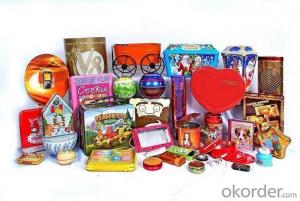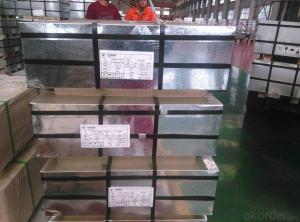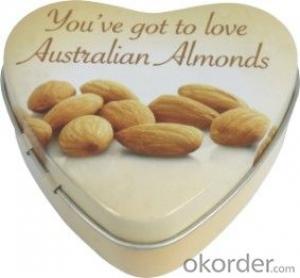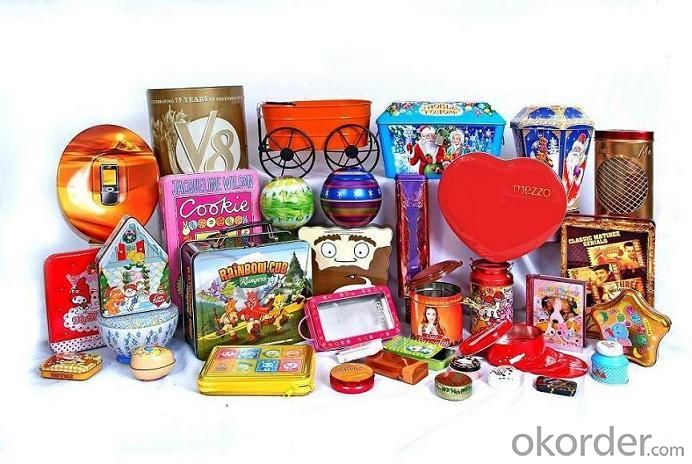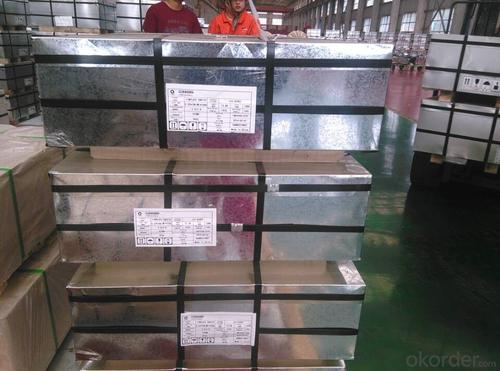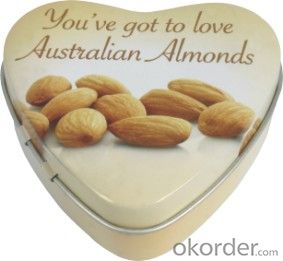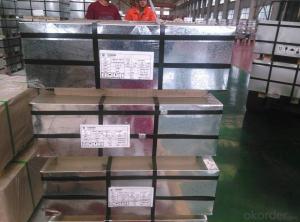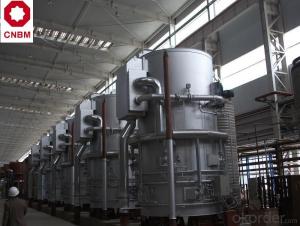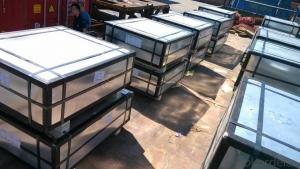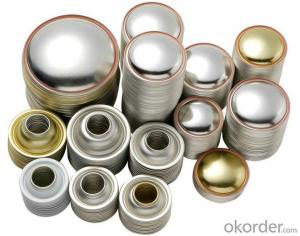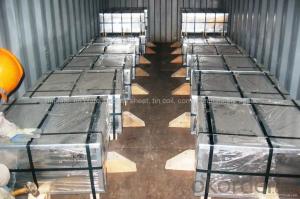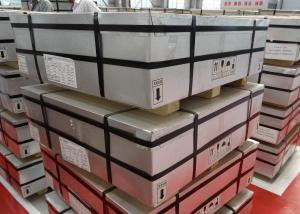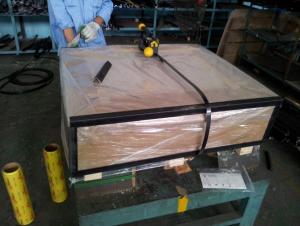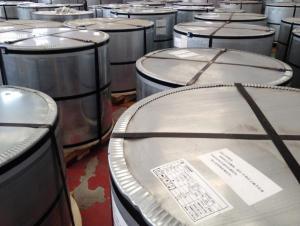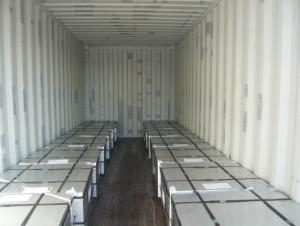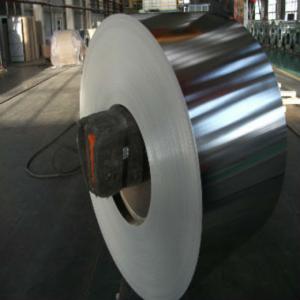Tinplate for Nuts Cans Usage, MR/SPCC Material
- Loading Port:
- Tianjin
- Payment Terms:
- TT OR LC
- Min Order Qty:
- 50 m.t.
- Supply Capability:
- 40000 m.t./month
OKorder Service Pledge
OKorder Financial Service
You Might Also Like
Specification
1.Usage
Tinplate is widely used for making all types of containers, containing industrial usage such as paint can, oil can, aerosol cans etc., and food cans like milk powder cans, tomato paste can, dry food cans etc.
2. Quality
As a state owned company and a large tinplate supplier in China, our tinplate quality ranks 1st level in China, similar to Bao Steel, Posco etc.
3. Specification
standard: GB/T2520, JIS G3303, DIN EN10202
Material: MR /SPCC
Thickness available: 0.16-0.50MM
Width available: 600~1050MM
Temper grade: T1 – DR8
Tin coating: ordinary 2.8g/2.8g, 5.6g/5.6g and others
Package: sea worthy export package.
Applications: Tin can for chemicals & paint cans, industrial cans, food cans
4. Our factory photo & equipments

5. Our Markets:
now our tinplate has been sold to more than 50 countries, including Europe country, Gulf Area, South American, South Afric etc.
6. Our Overseas Wareouses:
Furthermore, in the year 2014, we have more than 10 overseas warehouses all over the word, located in KSA, UAE, Oman, Russia, Kuwait, Qatar, Oman, Chile, Brazil etc.
7. FAQ
a. what’s your company name?
our company named CNBM international corporation, we are both one large state owned company and tinplate supplier in China
b. where your mill situated?
Our head office is in Beijing, while our mill in Hebei province.
c. how about the delivery time?
usually 55~65 days after receipt advance payment or original LC;
d. what payment term you accept?
Our payment term is very feasible, such as TT, DP, LC at sight, LC after sight etc.
e. can you offer MTC?
Of course, we will issue MTC after each shipment, for customer reference and testing if some quality issue appears.
- Q: What are the cost considerations of using tinplate packaging?
- Some cost considerations of using tinplate packaging include the initial investment in machinery and equipment for production, the cost of sourcing and purchasing tinplate materials, and the expenses associated with manufacturing and assembly processes. Additionally, transportation costs may be higher due to the weight and volume of tinplate packaging compared to other materials. However, tinplate's durability and potential for recyclability can offer long-term cost savings and environmental benefits.
- Q: How does tinplate perform in terms of product protection?
- Tinplate performs exceptionally well in terms of product protection. Its strong and durable nature ensures excellent resistance against corrosion, moisture, and oxygen, thus safeguarding the contents from external elements. Additionally, its ability to provide an airtight seal helps in preserving the product's freshness, flavor, and quality for an extended period. Overall, tinplate is a reliable and efficient packaging material for ensuring optimal product protection.
- Q: What are the common challenges faced in the production of tinplate?
- Some common challenges faced in the production of tinplate include ensuring consistent tin coating thickness, achieving uniform surface quality, preventing oxide formation on the tin surface, maintaining proper adhesion between tin and steel, controlling tinplate flatness, and managing the overall production cost.
- Q: How is the thickness of tinplate measured?
- The thickness of tinplate is typically measured using a micrometer or thickness gauge, which accurately determines the thickness of the tin coating on the steel substrate.
- Q: What are the printing options for tinplate?
- The printing options for tinplate include lithography, screen printing, and digital printing.
- Q: What are the main differences between tinplate and tinplate laminates in terms of barrier properties?
- Tinplate and tinplate laminates differ in terms of their barrier properties. Tinplate, which is made of a single layer of tin-coated steel, offers good barrier properties against moisture and gases. It provides a reliable protective barrier for food and beverage packaging. On the other hand, tinplate laminates consist of tinplate combined with other materials, such as plastic or paper. These laminates can enhance the barrier properties of tinplate, offering additional protection against light, oxygen, and other external factors. The use of laminates allows for customized packaging solutions that cater to specific product requirements. Overall, tinplate laminates provide a higher level of barrier protection compared to plain tinplate.
- Q: What are the main applications of tinplate in the stationery industry?
- Tinplate is commonly used in the stationery industry for various applications such as the production of pencil cases, pen holders, stationery boxes, and decorative containers. Its durability and resistance to corrosion make it an ideal material choice, ensuring the longevity of stationery products while providing an attractive and functional design. Additionally, tinplate can be easily customized with vibrant colors and intricate designs, enhancing the visual appeal of stationery items.
- Q: How does tinplate contribute to the preservation of paint products?
- Tinplate contributes to the preservation of paint products by providing a protective barrier between the paint and external elements. It prevents corrosion, oxidation, and moisture penetration, ensuring the paint remains in its optimal condition for an extended period of time.
- Q: What's the head iron?
- The name "tinplate", also known as tin plated iron, is the common name for tin plated steel sheet. The English abbreviation for "SPTE" refers to cold-rolled low carbon steel sheet or strip coated with commercially pure tin on both sides. Tin plays a major role in preventing corrosion and rusting. It will be the steel strength and formability and corrosion resistance of tin soldering, and beautiful appearance with a material, corrosion resistant, non-toxic, high strength and good ductility properties.
- Q: How is tinplate coated for gift packaging?
- Tinplate is typically coated for gift packaging using a process called electroplating, where a thin layer of tin is applied to the surface of the tinplate. This coating not only enhances the appearance of the packaging but also provides protection against corrosion and oxidation.
Send your message to us
Tinplate for Nuts Cans Usage, MR/SPCC Material
- Loading Port:
- Tianjin
- Payment Terms:
- TT OR LC
- Min Order Qty:
- 50 m.t.
- Supply Capability:
- 40000 m.t./month
OKorder Service Pledge
OKorder Financial Service
Similar products
Hot products
Hot Searches
Related keywords
